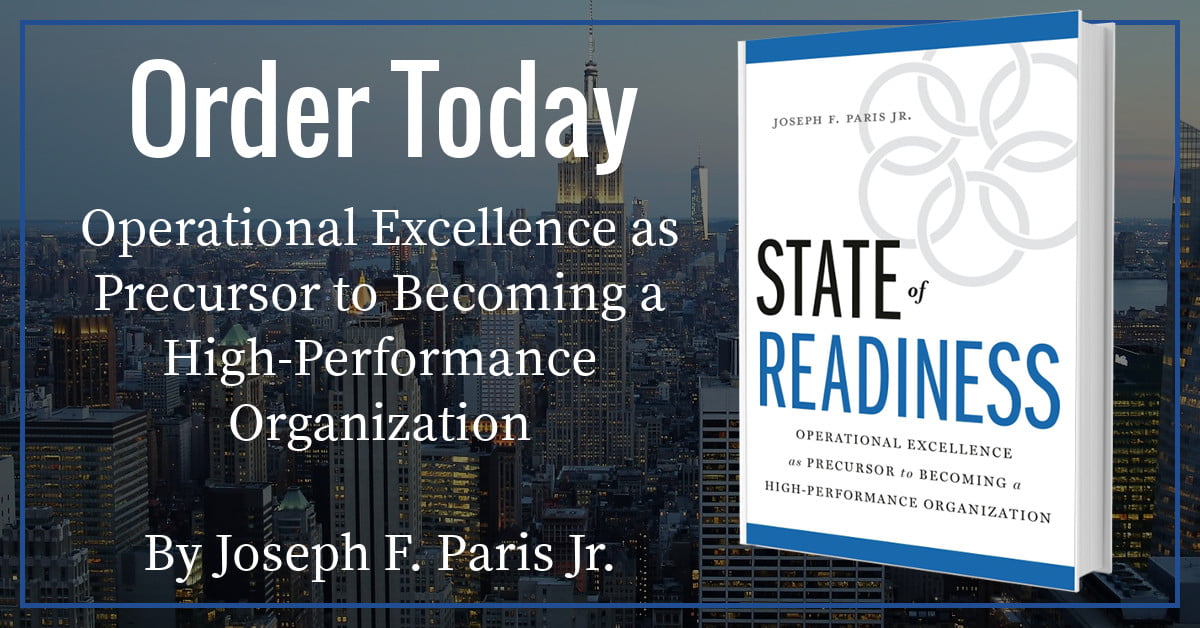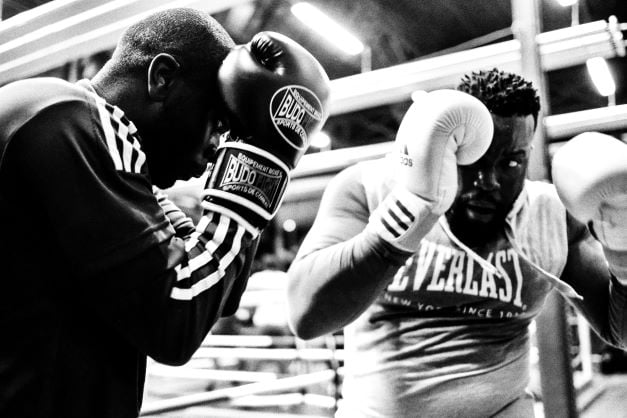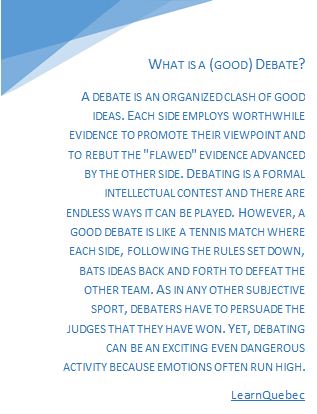Conflict and Consensus
Arguing and debate (I don’t generally feel there is a difference – except, perhaps, that a debate consists of a series of arguments) goes back to the beginning of the ages, probably starting at the very moment mankind was able to communicate. One of the most famous early debaters was Socrates, a philosopher from Ancient Greece who lived around 400-BC in Athens.
Socrates became famous for the manner in which he engaged in a debate; by asking open-ended questions of his opponent in order to stimulate critical thinking and to make an idea more clear by eliminating contradictions and conflicts – stripping away all of the distractions – until only the “truth” (whatever that means) remains. This method ultimately became known as the “Socratic Method”.

Debating should not be confused with quarrelling – which is when the logic and pragmatism of the debate is eroded by the introduction of emotion (thinkSpock versus McCoy in Star Trek) until it ultimately degenerates to a shouting match, and perhaps fisticuffs – even to the point of abandoning the Marquess of Queensbury Rules.
As a general rule, a good debate is healthy and quarrelling is not – and this gives us the primary rule of debate: Rule #1: “Whoever loses their temper or makes it personal first, loses.”
Never, ever, forget Rule #1.
I have met many people in business who held various leadership roles over the years; from shift leaders to department heads, to business unit executives, through to the “C-Suite” – a countless number, truth be told. And almost all of them had a passion for their roles within their companies, even if there was sometimes a lack of passion (not to mention, affection) for the company itself.
The one challenge they all share is to understand the circumstances and conditions under which they (and those around them) must operate, and to get others to align themselves towards the strategies of the company – with the former requiring the ability to be empathetic and the latter requiring the ability to be persuasive. It’s no wonder that being a great leader is difficult. In both cases, there is a gap that needs to be closed.
We can group the “states” of these gaps into three categories, the;
- Consensus State: In this state, both of the parties share the same aspirations or beliefs. The challenge here is to make sure that both parties understand the needs of, and are empathetic to, the circumstances of the other. Once accomplished, the development and deployment of a plan to go forward occurs fairly simply.
- Conflict State: In this state, both parties hold divergent aspirations or beliefs. The challenge here (and it is a considerable challenge) is to persuade one of the parties to change their aspirations or beliefs – perhaps even abandon them – so as to become aligned with and working towards the aspirations and beliefs of the other. It is very rare that one party will truly abandon their beliefs. More than likely, they will surrender their will to the other party and take on the role of “logistic” (being a contributing resource). Perhaps, over time, they will increase their acceptance and graduate to “tactician” (helping to develop the plans for engagement and pursuit of the strategy).
- Inert State: In this state, the aspirations of the parties are neither shared nor divergent. Neither party has any appreciable degree of passion in the subject and will go along with whatever – unless and until some “line” is crossed that challenges the understandings or beliefs of one of the parties. Then the state will change to either the Consensus state or Conflict state.

“It is better to debate a question without settling it, than to settle a question without debating it.”
– Joseph Joubert
Debate is hazardous duty. A primary expectation of debate should be that it seldom ends in agreement. Rather, debate forms the framework for a vigorous examination of the question at hand. We will expend a lot of energy trying to convince others that our way of thinking is best. We enter into the debate thinking that we will offer them facts which will prove our way and that, logically, they will embrace the same conclusions we have determined.
But we all know this is not how it works – and we need look no further than our own respective governments. For example; as an American, I cannot tell you the last time the Republicans worked with the Democrats (perhaps Ronald Reagan and Tip O’Neill in the early 1980’s). When is the last time someone changed your mind?
But a proper debate needn’t involve shouting, or fistfights, or imposing your will on someone. A good debate shouldn’t involve a heightened emotional state – even though it too often does. Such matches are rarely beneficial to anyone (please refer back to Rule #1 above).
Of course, sometimes we don’t want to debate – we would rather avoid the conflict. But avoiding does not make the challenge evaporate. In fact, avoiding a debate can actually make the challenge more acute by not engaging in a meaningful manner early-on and allowing time for it to escalate. And when the deferred debate is finally engaged, it often involves the injection of emotion because the threat associated with the challenge has been allowed to grow.
So, embrace the conflict – there is no need to dread it. Conflict is a normal state of being and is even healthy if engaged properly. The differences you have with others are occasions to learn – and often the conflict and debate will illuminate opportunities for personal growth.
So, if Rule #1 is: “Whoever loses their temper or makes it personal first, loses,” what is Rule #2?
… All of the following are Rules #2…
- Be prepared: Not only is this the motto of the Boy Scouts of America, it is critical for a successful debate – so make sure you are prepared. Whatever you do, never engage in a “surprise debate” that is in the “Conflict State” – you will likely lose mightily. So the first thing that needs to be done for a good debate is to agree to a time and place for having it (often the debate before the debate),Then begin preparing for the debate. Make sure you know what you want to get out of the engagement – how do you know if you have won? Do you want the other person to understand your point of view? Or do you want to convince them of something and realize some tangible result? Ensure you know the essential points you want to make, organize your thoughts, look for critical weaknesses and how you might respond. Do the research of the facts you are going to present (nothing will kill your position quicker than having inaccurate information).
- Know when to disengage: If the debate becomes emotional and heated, have the inner discipline to call a “time-out”. If you don’t disengage, the debate will enter a death-spiral, degenerate into a quarrel, and nothing good will come of it (in fact, considerable damage to the relationship might occur). Always attack the issues and arguments, never one another. Remember Rule #1.
- Listen intently, listen respectfully: Listen very carefully to what the other person is saying and how they are saying it. What is the tone and inflection of their voice? Is this an argument where there is no opportunity for compromise? Is there some hint of doubt or other weakness where compromise might be possible? Are they saying what they mean to say – or are they shielding their true thoughts? Is the static of “political correctness” casting a fog on the true belief or intent?I often tell people that “God gave you two ears and one mouth – therefore, you should listen twice as much as you talk.” When people feel strongly about something, it’s important to hear them out.Respectful listening requires recognizing their feelings. Whatever you do, don’t tell the other person how they should feel – they feel the way they feel. Be empathetic. Save sharing your point of view until the other person is satisfied that you appreciate their perspective – even if you don’t quite “get it”.
- Learn how to excel at delivering an argument: What is your end-goal? Will what you are about to say (content and structure) and the manner in which you say it (tone and body-language) progress you towards your end-goal? If not, reconstruct or strip it out of the debate. Make your arguments clear, concise – less is more. Use language that is easily understood and don’t rush the delivery – be very deliberate and clear. Stay away from using absolutes such as “never” and “always”, and keep the use of “pronouns” (it, them, he, she, they, etc…) to a minimum to diminish confusion.If at all possible, anticipate the arguments that might be presented by the other side and present your position first – not only will it steal the wind from their sails, but it will ensure you maintain control of the narrative. But be very careful and selective; do too much of this and you will come across as arrogant and aloof. Keep it simple and clear.Remember, the goal is not to beat the other person into accepting your position, but to gain their respect and appreciation of your position (and vice-versa) so that a common path forward can be crafted. Consider very carefully the arguments you can present that will be considered by the other person – which arguments will they have empathy for and find convincing? Which ones will be the “third-rail” and just cause emotion to be needlessly injected?It’s good to be curious, but don’t be defensive. Certainly, defending your facts (to the extent they are facts and not opinion) is appropriate if done in a non-combative manner. However, defending yourself personally injects emotion into the debate and risks escalating the intensity of the fight (remember Rule #1). The better approach is to be curious – asking for additional information, points of reference, details, perhaps examples. Meet and challenge with curiosity, and you open the door for understanding which can lead to compromise and resolution.
- Keep vigilant against ruses and other distractions: If your opponent is ill-prepared, or they realize their arguments are weak and they are losing the debate, they might start putting forth arguments which are abjectively baseless hoping to bait you into engaging emotionally and personally (remember, Rule #1). Remember to always speak softly, but confidently. The louder someone speaks (or worse, shouts), the less likely they are to be heard. So don’t speak in a hostile tone even if your opposition does. Keeping it civil (even if only one of the parties is doing so) makes it possible to focus on the issues instead of reacting to the rhetoric.
Be especially suspicious of your opponent’s use of statistics, as Mark Twain said, “There are lies, damn lies, and statistics”. Statistics, and the presentation thereof, can be manipulated very easily. The person with the weaker position will try to deflect the argument or the direction of the debate (keep it on track) – so always be alert for diversion tactics such as personal attacks, concealed questions, and false choices.
- The end-game: Remember, the objective of the debate is not to beat the other person into submitting to your beliefs (they never will) – but to gain a mutual respect and craft a way forward together. In fact, a successful conclusion of a debate might be one where everyone goes away neither completely satisfied nor completely dissatisfied.If a debate is going nowhere, it’s time to change perspective or otherwise be creative. Are there ways of increasing the pressure on the opponent so that they adjust their position? Is a compromise possible? There can almost always be found in specific aspects of a conflict, points of agreement that are waiting to be discovered. Finding and leveraging this commonality is an important start to forging a solution. Don’t be afraid of a pause on the debate, but only as a tactic for progress and not delay.The fighting ends when the cooperation starts. Asking for ideas or another possibility encourages collaboration. Careful contemplation of alternatives demonstrates respect. And suggesting alternatives of your own shows that you also are willing to try something new. So don’t be afraid to make concessions (perhaps being the first to do so). Even the smallest of concessions can cause an opponent to consider concessions of themselves. These small initial concessions build trust and will most probably lead to larger compromises (on the side of both parties). And the compromise doesn’t (necessarily) mean you’re always meeting each other exactly half-way – but that each side is feeling that there is a balance. In the end, it’s not about keeping score; it’s about engineering an outcome that is workable.
- Maintain civility, preserve relationships: This is the key to success – that the debate was engaged in a civil manner. Even if commonality is not discovered (this time), there is enough mutual respect built that any “next time” would be welcome. Remember, each of you have to move forward – live to debate another day.If your desired end-result is to win at all costs – to aggravate, embarrass, and humiliate your opponent – you might win the battle, but you will lose the war. Remember, you and your opponents paths will cross again (maybe even later that same day). Each of you have your own personal and professional networks that will conspire against you if they believe you to be a bully. You will regret your aggressions eventually (perhaps sooner rather than later).So at the end of the debate – win, lose or draw – make peace.
Debates, and the individual arguments of which debates consist – and for that matter discussions and conversations in general – should be about having the ability and willingness to see things through the eyes of another, to be empathetic. And to jointly build on the common ground that both work hard at discovering to so that we might successfully chase our individual, and collective, aspirations.
This means the “game” of debating is always more important than any individual outcome.
Debate between any two individuals who meet on a regular basis is inevitable – and, not only is it inevitable, it is healthy. And to have a debate that is constructive and within a healthy framework requires having a command of debating skills. To be able to have open and honest discourse, yet retain mutual respect – to be able to engage in conflict, and reach consensus.
About the author
Joseph Paris is an international expert in the field of Operational Excellence, organizational design, strategy development and deployment, and helping companies become high-performance organizations. His vehicles for change include being the Founder of; the XONITEK Group of Companies; the Operational Excellence Society; and the Readiness Institute.
He is a sought-after speaker and lecturer and his book, “State of Readiness” has been endorsed by senior leaders at some of the most respected companies in the world.
Click here to learn more about Joseph Paris or connect with him on LinkedIn.









